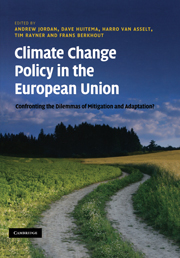Book contents
- Frontmatter
- Contents
- Foreword
- Preface
- List of contributors
- List of abbreviations
- Part I Introduction and overview
- Part II The evolving governance context: the European Union
- Part III Climate policy in the European Union: understanding the past
- Part IV Climate policy in the European Union: future challenges
- Part V Climate policy in the European Union: retrospect and prospect
- Index
Preface
Published online by Cambridge University Press: 05 August 2011
- Frontmatter
- Contents
- Foreword
- Preface
- List of contributors
- List of abbreviations
- Part I Introduction and overview
- Part II The evolving governance context: the European Union
- Part III Climate policy in the European Union: understanding the past
- Part IV Climate policy in the European Union: future challenges
- Part V Climate policy in the European Union: retrospect and prospect
- Index
Summary
Climate change is shaping up to be one of the defining issues of this century. Once a matter that only preoccupied a fairly select group of atmospheric scientists, in the past few years it has forcefully entered the political mainstream in many industrialised states, demanding a political and policy response at all levels of governance. Not only is climate change scientifically very complex but it also raises very challenging governance issues. This is because addressing climate change and its consequences requires governors to make policy interventions that will deeply affect production and consumption decisions right across the world. In this book we focus on the policy choices and their associated governance dilemmas that are constitutive of these interventions. By using the term ‘governance’ instead of government, we seek to draw attention to the changing context in which these policy choices have been (and will in the foreseeable future be) made. So, whereas in the past, governments made and implemented the key choices, today governing – at least in Europe – is undertaken among a wider array of actors, including those in the private sector.
In the first chapter, we argue that governing is a purposive activity, which involves making difficult choices between alternative options supported by different groups of actors who commonly subscribe to values that are partly and sometimes wholly incommensurate.
- Type
- Chapter
- Information
- Climate Change Policy in the European UnionConfronting the Dilemmas of Mitigation and Adaptation?, pp. xv - xviiiPublisher: Cambridge University PressPrint publication year: 2010
- 1
- Cited by



